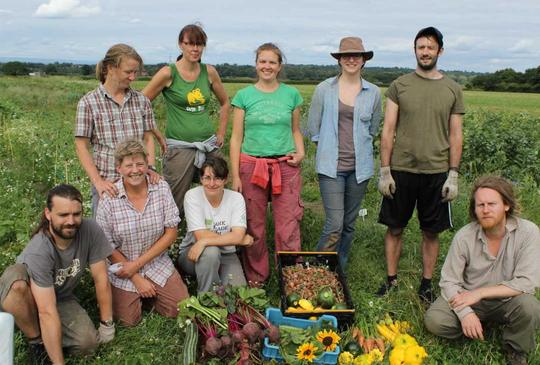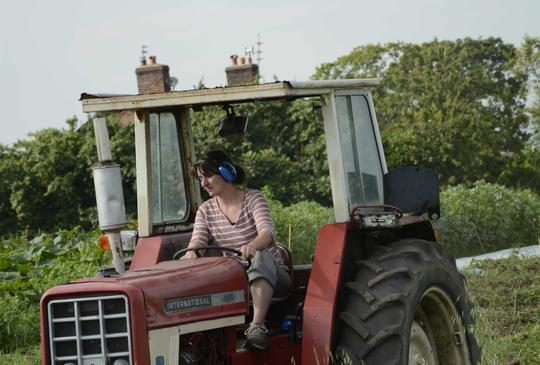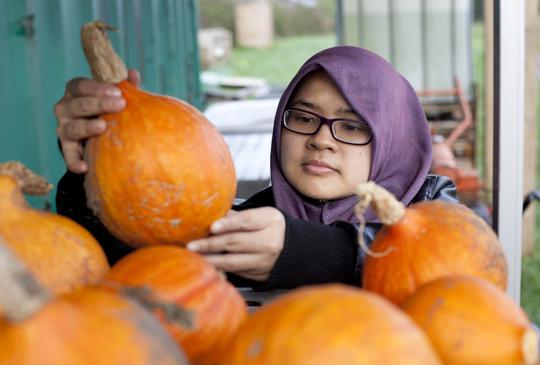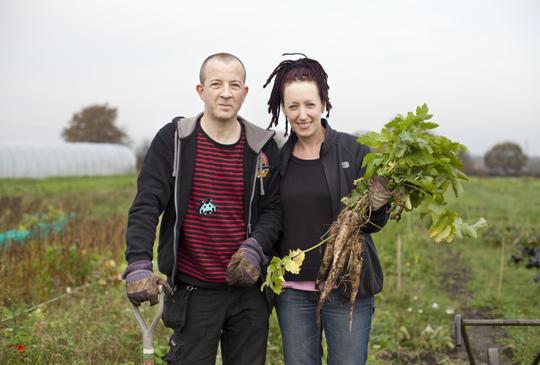
The future of farming?
The Kindling Trust brought the FarmStart model to Manchester in March 2013. Inspired by similar projects, under the same name, in the USA and Canada, this was not just Manchester’s, but the UK’s first business incubator farm.
Now entering its third growing season, the project provides a mentored, low-risk route into sustainable organic farming. Novices join as TestCroppers, giving them an opportunity to get a feel for it. They then have the opportunity to invest £500 and take on 1/4 acre of certified organic, flat and fertile land at Abbey Leys Farm, in Knutsford, around 15 miles south of the city centre, for a season. Kindling’s team plough the land and work the heavy machinery. FarmStarters get training, mentoring and use of equipment. They pay for their own seeds and additional machinery, water and diesel.

Using his experience as a social entrepreneur and a grower himself, Chris Walsh is driving Manchester-based Kindling’s ambition to create systematic change in the ‘screwed up’ food system and explains the ethos behind FarmStart’s inception. He says:
“We were looking for a solution to a problem we had, which is that there is a latent demand for sustainable food but not much organic commercial growing in the north west. The market in this region is one of the least developed. Kindling is constantly thinking 10 years ahead looking for new farms and ways to meet this demand. It’s a five year programme. It started with no money, just us thinking ‘let’s try this’.”
The two-acres that they started with now has a shipping container, compost toilets and water supply. The concept is approved and has secured funding from sources including the Prince’s Countryside Fund, allowing them to introduce infrastructure to the site.

FarmStarters are free agents but they and their produce are channelled towards Manchester Veg People - a Kindling partner who pick up from the site and are involved in crop planning; the idea being that they provide a ready market and can grow that market by meeting its demands. Other options are the Abbey Leys farm shop and farmers market. Kindling also arrange pick up from food access programmes to find an outlet for anything that is not selling. Some farmers choose to do their own markets of veg box schemes.
“The first thing we do is manage expectations,” Chris says. “There’s quite a romantic view of commercial growing. We spend quite a lot of time trying to put people off and explain you’re not going to make money initially. We’re offering them a low risk way to try it out.”
Year one started with ten people. Half of those left and ten more joined in year two. This year, two have dropped out and six joined (including one returning), meaning this summer should see around 20-25 farmers on site.
People offer varied reasons for leaving, be it change of circumstances, the offer of more secure work, or simply that the project did not meet their expectations, according to Chris. Perhaps some could not shake that romantic view. This all forms part of the learning process for Kindling. “We’re constantly learning lessons,” he says. “We haven’t got the model right yet. We’re already looking to improve it.”

It is already attracting the interest of similar models elsewhere in the UK, of which there are but a handful. Chris believes they are around two years ahead of the others. They are due to open a second site in Stockport as part of the Sustainable Food Cities programme. Their aim is four Greater Manchester sites. That is when the model will become viable, however, it is not about the margins.
Kindling is clear about what success looks like although, there is, currently, no obvious route to achieving that on scale. “For us success looks like paying the true price of production so if our farmers ask for a true price for production and get it. Our FarmStarters are still working through what that means.
“We think the key is the public sector. People on low incomes will have a whole range of other priorities in their own lives and aren't in a position to buy organic food. Being a small organisation we’re not able to influence or change the way the system works. But maybe we can influence the public sector to buy in from farmers, for schools, prisons etc and make this fresher food available to people who wouldn’t already have had it."
“They need to look less at price and more about benefits - health, education, low carbon. By example, we did work with Manchester City Council looking at school meals, making them more organic, with less meat on the menu, and actually found that can be cheaper.”
There has been some pick up by the public sector already. FarmStart are part of the procurement chain for Oldham’s primary schools and The University of Manchester - contracts worth £100,000 between them.
“The university has taken a really positive approach so they’ve said ‘within our campus, who can you supply?’ We started small, supplying the cafe then move to more cafes and then halls of residence. As that’s gone along they’ve informed what we’ve grown. They've come and seen the farmers and the farmers have had the opportunity to speak to the chefs.”

To an outsider, it appears that what they face now is something of a potential impasse. Either FarmStart needs to prove to the wider public sector that it has the capacity to supply them or the public sector needs to demonstrate a commitment to help them grow. Clearly, procurement officers also need greater convincing of the benefits of what is currently viewed as a more expensive, less reliable model.
Chris explains: “We’re constantly balancing supply and demand. Often a public sector body will say we want 20 tonnes of potatoes every day in day out, every day for a year but you can’t do that. We say if that’s your attitude we don’t want to work with you. These kinds of arguments are often just an excuse not to change.”
Expectation is a fundamental part of the challenge facing FarmStart. It is not a generational style of farming that has the experience of predecessors, nor are there clear successors for whatever model is settled upon because, as yet, no one is making a satisfactory living from this alone.
Those behind FarmStart are pragmatic about it: “Any intervention of the supply chain you just move the problem along; it just gets eclipsed by another problem.” At the end of the chain are consumers, in a market saturated by competing health advice, food fads and budgets.
Chris says: “People are really passionate about food and really understand what’s good and bad food. People are under a whole range of stresses and have other priorities. Whenever we have conversations with people, or you start relationships with people, its about saying we’re all starting in different places and we’re very pragmatic that there isn’t one solution. Being vegan, or eating organic food, isn't the solution. There are so many challenges and competing ethics you just have to collectively move in the right direction. For some people its taste, some its Fairtrade, animal welfare, some people it’s feeding their kids.”
Contributor Profile
Deborah is a freelance journalist with more than ten years experience of news, comment, analysis and interviews with some of the country, and the region's, highest profile figures. Her work covers a broad spectrum of writing and communications for media, public and private sectors.
@deblinton




